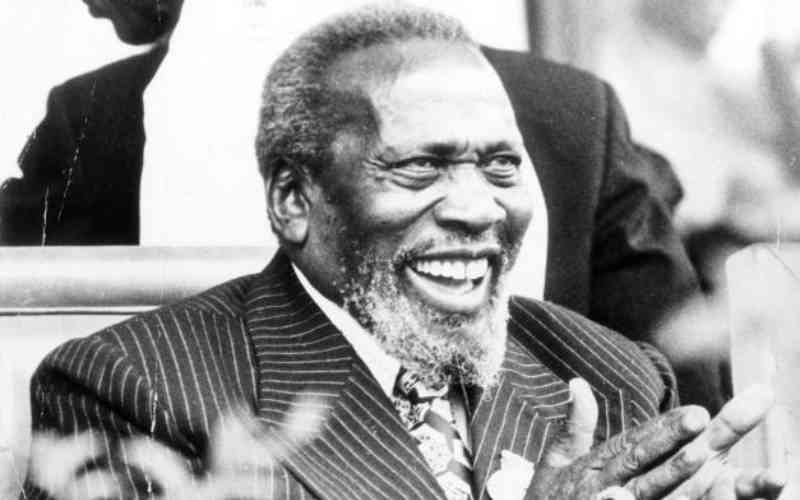On the morning of August 22, 1978, Kenya woke to a strange quiet.
The radio broke the news that Mzee Jomo Kenyatta, the founding father, had died.
For a young nation still learning the rhythm of independence, it felt like the fall of a giant tree in the village.
The silence after the announcement was heavy, uncertain, filled with unspoken fears of what would follow.
Follow The Standard
channel
on WhatsApp
Forty-seven years later, Kenyatta is still everywhere. In statues, on currency, in the names of schools, streets, and an airport.
Yet ask most Kenyans born after 1978 don’t know who Kenyatta really was, and the answers are often shallow.
“The first president, the man with the fly-whisk, Uhuru’s father or the president who was buried in parliament.” Some would say.
But those who encountered him remember something striking. Jomo Kenyatta’s presence was defined less by the words he spoke and more by the silences he held.
Silence as strategy
At the Lancaster House talks in London, where the independence of Kenya was being negotiated, Kenyatta was not the loudest in the room.
Historical accounts of the Lancaster talks describe him as a man who listened more than he spoke.
Delegates recall his ability to listen, to let others speak until they revealed too much, then to strike with a few carefully chosen words.
His silences unsettled opponents more than long speeches ever could. To the colonial negotiators used to debate and chatter, Kenyatta’s pauses were unnerving.
He seemed to embody the patience of a people who had waited too long for freedom.
In the new Kenya, that same strategy was carried into State House.
Cabinet ministers recall meetings where Kenyatta would sit back, stroking his fly-whisk, letting silence stretch until it became unbearable.
Someone would eventually speak, saying what he had already decided. The silence was his command. It forced his team to fill the void on his terms.
Silence as presence
Outside politics, Kenyatta’s silences softened.
In Gatundu, after visitors left, he often sat in his garden, sometimes gazing at the slopes of Mount Kenya, other times simply listening.
He loved storytelling, weaving kikuyu folklore with pauses so deliberate that children listened in, waiting for the next twist
To him, silence was a tool of rhythm. In folktales, in music, and in life itself.
He was also a farmer in spirit. Long before state house lawns, Jomo Kenyatta tilled soil and walked through shambas.
Farming, like silence, taught patience.
Perhaps it was no accident that he saw independence in agricultural terms; freedom meant little if the stomach was empty. To farm was to resist despair.
Silence as controversy
But not all silences are golden.
Kenyatta’s refusal to address certain national questions still lingers as part of his complex legacy.
On land redistribution, his quietness often protected the interests of the political elite rather than the landless who had fought for independence.
On the detention of political opponents, silence became complicity. To critics, Kenyatta’s silences were not wisdom but avoidance, the unwillingness to confront the wounds of the young nation.
This contradiction is part of what makes Kenyatta both admired and contested.
His silences gave him authority, yet they also left gaps that generations continue to debate. Was it restraint or evasion? Was it wisdom or fear?
Lessons for today
In today’s Kenya, politics is noisy.
Leaders chase cameras, fill rallies with soundbites and flood social media with statements.
The art of listening has nearly disappeared. In that context, Kenyatta’s silences stand out even more sharply.
What would it mean if leaders paused more and spoke less? If they listened longer before making decisions? If they allowed silence to carry weight instead of rushing to fill every space with noise?
Of course, Kenyatta’s silences had costs, but they also had power.
They made people listen, reflect and lean in. They forced both allies and opponents to measure their own words carefully.
His silences remind us that sometimes restraint is the deeper form of strength.
A quiet legacy
Forty-seven years on, Kenyatta remains a paradox, both monument and mystery.
For many Kenyans, he is frozen in images: the fly-whisk in hand, the regal posture, the commanding presence. But behind those images was a man who understood the weight of silence.
To remember him today is not only to recall the loud milestones of independence and nation head but also the quiet moments in between the pauses, the unspoken decisions, the stories told by firelight, the silences that carried meaning beyond words.
In an era where leadership is too often measured by how loudly one can speak, perhaps Kenyatta’s legacy is this.
That sometimes silence is not weakness but a different kind of voice.
Because even in death, forty-seven years later, Jomo Kenyatta’s silences still echo.
Follow The Standard
channel
on WhatsApp
By Faith Oyoo
